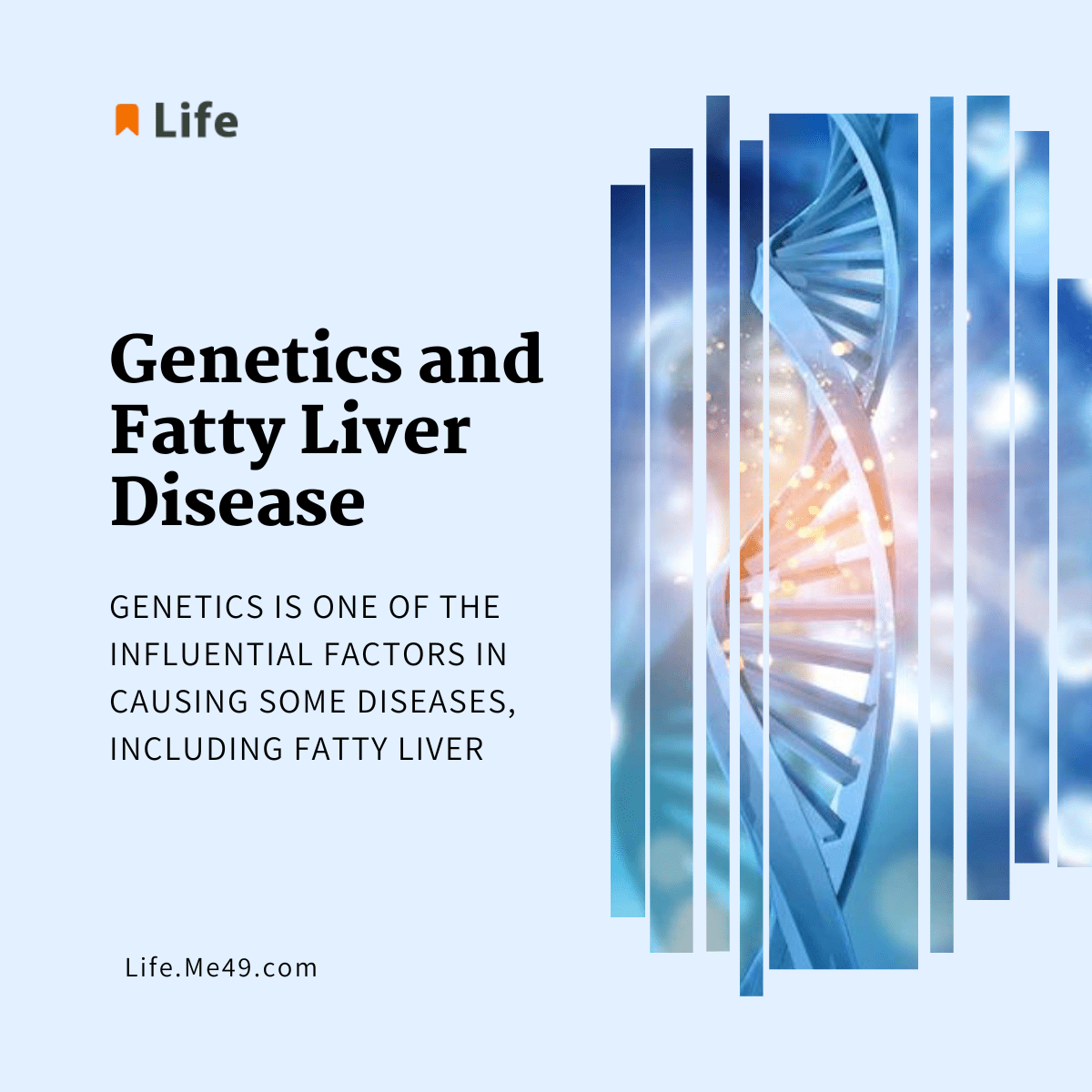In the ever-evolving landscape of medical science, one area that continues to captivate researchers and health professionals is the connection between genetics and fatty liver disease.
Fatty liver disease, characterized by the accumulation of fat in the liver, is a widespread health concern.
Understanding the role that genetics plays in its development and progression is crucial.
In this comprehensive guide, we will delve deep into the complex interplay between genetics and fatty liver disease, shedding light on how your genes can influence your liver’s health.
The Genetic Landscape of Fatty Liver Disease
Unraveling the Genetic Code
Genetics serves as the intricate blueprint that guides the construction and functioning of our bodies.
It plays a pivotal role in shaping various facets of our health, from our physical attributes to our susceptibility to specific medical conditions.
Among these conditions, Fatty Liver Disease stands out as a prime example of how our genetic makeup can influence our risk and prognosis.
Fatty Liver Disease manifests in two primary forms: non-alcoholic (NAFLD) and alcoholic (AFLD).
Within the realm of genetics and Fatty Liver Disease, researchers have uncovered compelling evidence of genetic components that can significantly impact an individual’s risk of developing these conditions.
When we delve into the genetic basis of Fatty Liver Disease, we unearth a complex network of genes and genetic variations that can influence the disease’s onset and progression.
These genetic factors interact with various environmental elements, such as diet, lifestyle choices, and exposure to alcohol, creating a multifaceted interplay that determines an individual’s vulnerability to Fatty Liver Disease.
In the context of non-alcoholic fatty liver disease (NAFLD), specific genetic variations have been identified that can elevate the risk of accumulating excess fat in the liver.
Some of these genetic factors relate to how the body metabolizes and stores fat, and others are associated with insulin resistance, a condition that often precedes and exacerbates NAFLD. Individuals who carry these genetic variants may find themselves more susceptible to NAFLD even in the absence of significant alcohol consumption.
On the other hand, alcoholic fatty liver disease (AFLD) also possesses a genetic component that can influence an individual’s likelihood of developing the condition.
Certain genetic variations can affect how the body processes and detoxifies alcohol.
Those with genetic factors that impair alcohol metabolism may be at an elevated risk of experiencing liver damage due to alcohol consumption, including the development of AFLD.
Moreover, the role of genetics extends beyond merely predisposing individuals to Fatty Liver Disease.
It can also impact the severity and progression of the condition.
Some genetic variants are associated with more aggressive forms of the disease, potentially leading to advanced stages of liver fibrosis, cirrhosis, or other complications.
In summary, genetics serves as a fundamental determinant in the intricate web of factors contributing to Fatty Liver Disease.
It influences an individual’s susceptibility, the type of Fatty Liver Disease they may develop, and the potential severity of the condition.
While genetics undoubtedly plays a significant role, it is essential to remember that lifestyle choices, such as diet, exercise, and alcohol consumption, remain powerful influencers in managing and mitigating the risk of Fatty Liver Disease.
Genetic Risk Factors
- Family History: One of the most direct links between genetics and fatty liver disease is a family history of the condition. If you have close relatives who have battled fatty liver disease, your genetic predisposition to it may be higher.
- Genetic Variations: Certain genetic variations, such as those related to lipid metabolism, insulin resistance, and inflammation, have been associated with an increased risk of fatty liver disease. These variations can affect how your body processes and stores fat, potentially leading to liver fat accumulation.
- Ethnicity: Genetics can also vary by ethnicity, and some ethnic groups have a higher prevalence of fatty liver disease. For example, individuals of Hispanic, Asian, or Pacific Islander descent may be more susceptible.
The Role of Genetics in fatty liver
Impact on Disease Severity
Genetics doesn’t solely determine whether you’re susceptible to fatty liver disease; it also plays a crucial role in shaping the trajectory and severity of the condition.
Beyond the initial risk factors, genetic factors can significantly impact how Fatty Liver Disease progresses in individuals, potentially leading to more severe liver complications.
One of the critical aspects influenced by genetics is the propensity to develop advanced stages of liver fibrosis or cirrhosis.
These are the most concerning and severe outcomes of Fatty Liver Disease, and they can have substantial consequences for an individual’s health.
Liver Fibrosis
Genetic factors can contribute to the progression of liver fibrosis, a condition characterized by the excessive buildup of fibrous tissue in the liver.
This process can impair liver function over time. Some individuals possess genetic variations that predispose them to more rapid fibrosis development, even in the presence of similar risk factors as others.
As fibrosis advances, it can result in compromised liver function, leading to symptoms and potential complications.
Cirrhosis
Cirrhosis represents the most advanced stage of scarring and damage in the liver.
Genetic factors can influence an individual’s likelihood of developing cirrhosis as a consequence of Fatty Liver Disease.
Certain genetic variations may accelerate the scarring process, making the liver less resilient to damage and repair.
Consequently, individuals with these genetic predispositions may progress to cirrhosis more swiftly than those without these genetic markers.
It’s essential to emphasize that while genetics can impact the course and severity of Fatty Liver Disease, they are not the sole determinants.
Lifestyle factors, including diet, alcohol consumption, and physical activity, continue to exert substantial influence.
Moreover, timely diagnosis, medical intervention, and proactive management can help mitigate the impact of genetic predispositions on the progression of the disease.
Understanding the interplay between genetics and Fatty Liver Disease is an ongoing area of research.
As our knowledge deepens, healthcare providers can better tailor treatment and management strategies to individuals based on their unique genetic profiles.
This personalized approach holds the potential to improve outcomes and enhance the quality of life for those affected by this complex liver condition.
In conclusion, genetics introduces an additional layer of complexity to the already intricate landscape of Fatty Liver Disease.
While it can influence the development of advanced stages such as liver fibrosis and cirrhosis, it’s essential to view genetics as one part of the broader picture.
Lifestyle modifications and medical interventions remain critical in managing and mitigating the impact of these genetic factors, offering hope for better outcomes for individuals living with Fatty Liver Disease.
The Interaction Between Genes and Environment
While genetics can play a significant role in fatty liver disease, it’s essential to recognize that it doesn’t act in isolation.
Lifestyle factors, such as diet, physical activity, and alcohol consumption, also contribute to the development and progression of the disease.
In fact
the interplay between genetic predisposition and environmental factors is a key area of study in the field of genetics and fatty liver disease.
The Future of Fatty Liver Disease Management
As our understanding of genetics advances, so does the potential for personalized approaches to healthcare.
Genetic testing can provide valuable insights into an individual’s risk of developing fatty liver disease and their likely response to specific treatments.
This tailored approach holds promise for more effective disease management in the future.
FAQs
Can genetics determine whether I will get fatty liver disease?
Genetics can increase your risk, but lifestyle factors also play a significant role. A healthy lifestyle can mitigate genetic predisposition.
Is fatty liver disease hereditary?
While it can run in families, lifestyle factors often play a crucial role in its development.
Can genetic testing predict my risk of fatty liver disease?
Genetic testing can provide insights, but it’s not the sole determinant of risk. A holistic approach that considers genetics and lifestyle is essential.
Are certain ethnic groups more susceptible to fatty liver disease due to genetics?
Yes, some ethnicities have a higher genetic predisposition to fatty liver disease.
How can I manage fatty liver disease if it runs in my family?
Focus on a healthy lifestyle, including a balanced diet, regular exercise, and avoiding excessive alcohol consumption. Consult a healthcare provider for personalized guidance.
Is there a cure for fatty liver disease if it’s influenced by genetics?
Currently, there is no cure, but lifestyle modifications and medical treatments can help manage the condition.
Conclusion
In the realm of fatty liver disease, genetics and lifestyle are intertwined factors that influence your risk and the course of the condition.
Understanding the genetic aspects of fatty liver disease is a crucial step in personalizing healthcare and developing more effective management strategies.
While genetics may play a role, lifestyle choices remain a powerful tool in mitigating risk and promoting liver health.
By embracing a healthy lifestyle and staying informed about your genetic predisposition, you can take proactive steps towards a healthier future.








